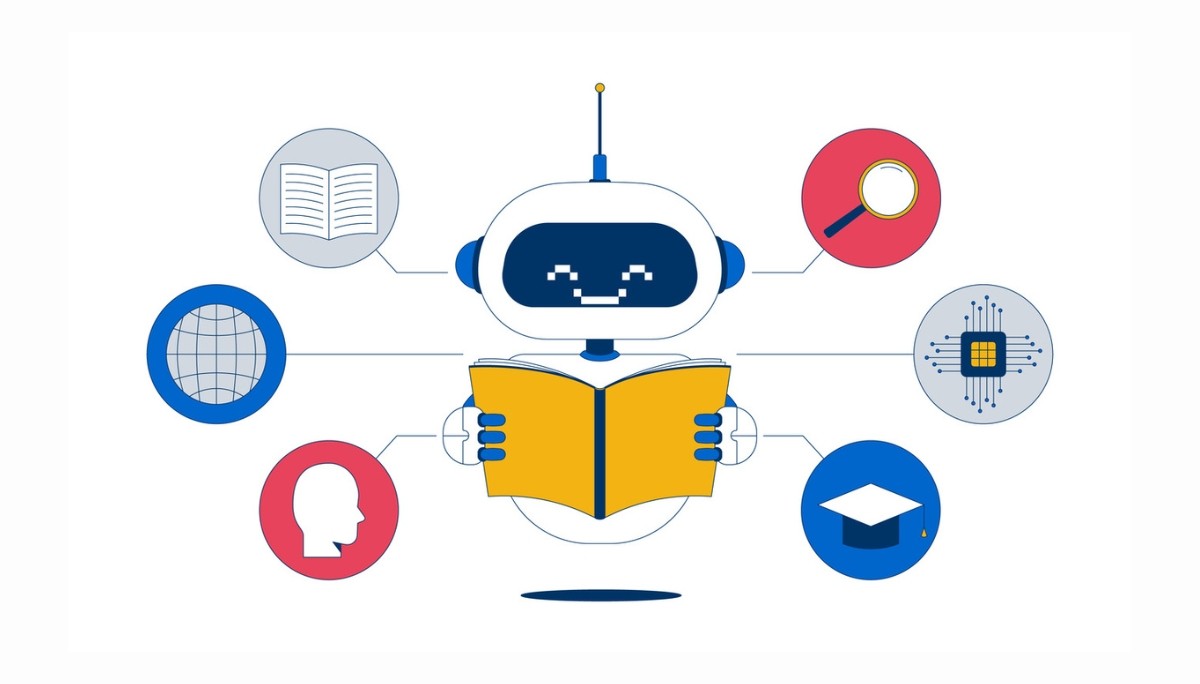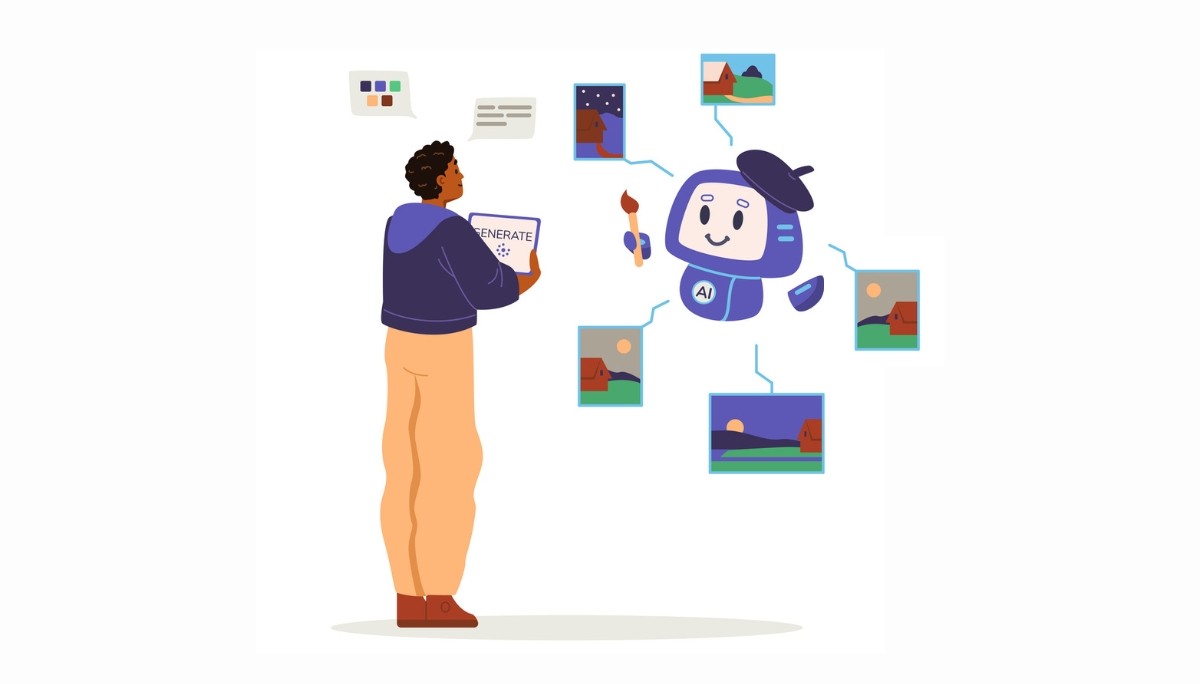Wondering what you can do with AI? From digital assistants like Siri and Alexa to advanced tools that automate business operations, artificial intelligence is reshaping how we live and work. Its applications extend across multiple industries, improving efficiency, enhancing customer experiences, and enabling smarter decision-making.
In this article, we’ll explore the ways AI is transforming everyday life and driving innovation in sectors such as healthcare, finance, retail, and beyond. These real-world applications highlight AI’s versatility and its ability to improve both daily life and work processes.
Key Takeaways
AI improves everyday life by automating routine tasks through digital assistants and smart home devices, improving both productivity and convenience.
In business, AI drives efficiency through predictive analytics and customer service automation, enabling data-driven decision-making and improving customer interactions.
AI is also transforming sectors such as healthcare and education by enhancing diagnostic accuracy, personalizing treatments, and creating tailored learning experiences.
Enhancing Everyday Life with AI

AI has integrated into daily life, making tasks easier and more efficient. These systems replicate aspects of human thought and decision-making through sophisticated algorithms, making them indispensable across a wide range of applications. From automating routine processes to enhancing the functionality of existing products, AI technologies are transforming how we live and work.
For example, search engines leverage AI to deliver more accurate results based on user queries, while smart home devices use AI to automate and optimize household management, increasing both productivity and convenience in daily routines.
Digital Assistants and Virtual Assistants
Digital assistants like Siri and Alexa have become integral to managing daily activities. These AI-powered services operate around the clock, providing assistance via voice or text and leveraging natural language processing to make interactions seamless and intuitive. Whether setting reminders, playing music, or controlling smart home devices, digital assistants deliver convenience and efficiency in everyday life through advanced speech recognition and generative AI capabilities.
Designed to perform specific tasks, these virtual assistants act as reliable AI agents in daily routines. By utilizing complex algorithms to understand and respond to natural human language, they remain highly user-friendly and effective. Automating repetitive tasks allows these AI solutions to free up cognitive effort for more creative and strategic activities, ultimately enhancing productivity and overall quality of life.
Smart Home Devices
Smart home devices are another significant application of AI, transforming home automation and management. Common examples include:
Smart thermostats
Robot vacuum cleaners
AI-powered security systems
These devices program routine tasks, increasing both convenience and energy efficiency. By utilizing AI, they learn user preferences and adapt to daily routines, making homes more intelligent and responsive.
The integration of virtual assistants within smart home ecosystems creates a seamless experience, allowing users to control multiple devices effortlessly.
AI in Business Operations

AI is a game-changer in business operations, driving efficiency and cost savings through automation and data-driven decision-making. AI systems analyze large datasets in real time, streamlining processes and improving decision-making across sectors such as finance, healthcare, and logistics.
Predictive analytics powered by AI enables businesses to make strategic decisions by delivering insights into customer behavior and market trends. In logistics, AI technologies optimize fuel consumption and improve transport safety by suggesting efficient routes, reducing accidents linked to driver fatigue.
Customer Service Automation
AI has transformed customer service through the use of chatbots and virtual assistants. These AI-powered solutions leverage natural language processing and generative AI to interact with users, resolve inquiries, manage support tickets, and deliver consistent, around-the-clock service. Automating these tasks not only enhances the customer experience but also reduces staffing demands, allowing human agents to focus on complex issues and improve overall service quality.
AI-driven customer relationship management (CRM) systems take this further by providing actionable insights into customer behavior and preferences.
Predictive Analytics for Business Decisions
Predictive analytics is a powerful AI application that equips businesses to make informed strategic decisions. By identifying patterns and trends in large datasets, AI helps guide business strategies, optimize operations, and anticipate potential challenges. Predictive modeling forecasts specific outcomes by analyzing data, enhancing efforts across various sectors.
AI’s ability to predict demand by evaluating multiple data factors leads to improved inventory management and reduced stock shortages. Furthermore, AI can forecast future purchasing behaviors based on customer data, enabling more targeted and effective marketing strategies.
To fully leverage AI in business decision-making, a comprehensive data strategy is essential. This includes prioritizing data quality and infrastructure, highlighting the role of data scientists in driving innovative data analysis and refining data processing models.
Revolutionizing Healthcare with AI

AI is revolutionizing healthcare by improving diagnostic accuracy, personalizing treatment plans, and accelerating research and development. AI-powered software supports physicians by streamlining workflows and minimizing human error. Leveraging deep learning, AI systems achieve high accuracy in analyzing complex medical data.
Diagnostic Tools
AI has significantly advanced diagnostic accuracy, especially in medical imaging. By recognizing patterns in complex images that might be overlooked by human observers, AI enables more precise diagnoses. These tools analyze data from diverse imaging techniques, assisting healthcare professionals in identifying diseases earlier and more accurately, ultimately improving patient outcomes.
Personalized Medicine
Personalized medicine is another area where AI makes a significant impact. By analyzing individual patient data, including genetic information, AI customizes treatment plans tailored to each patient’s unique needs. This personalized approach increases treatment effectiveness and ensures therapies are better tolerated, resulting in noticeably improved treatment success.
AI in Marketing and Sales
AI is transforming marketing and sales by enabling highly personalized campaigns and automating sales processes. By analyzing customer behavior data, AI systems deliver targeted advertising and optimize customer engagement.
Generative AI further enhances marketing efforts by creating diverse creative content, including text, images, and music, boosting engagement across platforms. Currently, over 75% of marketers use AI-generated images to increase productivity and enrich content creation.
Personalized Marketing Campaigns
AI analyzes customer behavior data to deliver highly personalized marketing content and recommendations. By categorizing customer actions and preferences, AI tailors marketing communications to enhance targeting precision, ensuring the right message reaches the right audience. Additionally, AI-powered copywriting tools craft content that resonates with specific demographics, making marketing efforts more engaging.
Sales Automation Tools
AI-driven sales automation tools streamline sales processes by automating tasks such as lead scoring and customer follow-ups. These tools assess prospects based on their interaction history with a brand, enabling sales teams to prioritize potential clients according to their likelihood of conversion.
Additionally, AI improves sales forecasting by analyzing historical data and current market trends.
AI in Content Creation

AI has become an essential tool in content creation, enabling the generation of creative work across various media. Generative AI produces original content by encoding simplified representations of training data. AI-enhanced text editors analyze user input and compare it with existing online content to ensure originality, streamlining the writing process.
The integration of AI tools in content creation helps both the quality and productivity of creators.
Automated Copywriting
AI-generated content can significantly reduce the time required to produce a 500-word article, streamlining the writing process. Leveraging natural language processing and machine learning, AI copywriting tools generate content that closely mimics human writing styles, making them ideal for marketing copy and tight deadlines.
AI in Visual Content Creation
AI technologies are revolutionizing visual content creation by automating the generation of images and videos, streamlining the production of marketing materials. Tools like Canva enable users to create images with minimal effort by leveraging advanced image recognition and computer vision capabilities. Similarly, platforms such as Adobe Creative Cloud integrate AI to automate design tasks, making the creation of art and visual content faster and more efficient.
AI video content creation tools like InVideo offer ready-made templates that simplify the video production process. AI technologies automate tasks ranging from editing to rendering, significantly reducing the time and effort involved.
Tools such as Divi AI facilitate the creation of contextually relevant visuals and content for web pages, allowing creators to concentrate on the creative aspects of their work.
AI in Education
AI is reshaping education by introducing advanced technologies that enhance personalized learning and boost student engagement. These AI systems create tailored, interactive learning experiences, significantly transforming traditional educational environments.
By adapting to individual student needs and preferences, AI-driven approaches tailor learning experiences to individual needs.
Personalized Learning Experiences
AI-driven adaptive learning systems customize educational content to align with each student’s unique pace and learning style. By analyzing individual performance data, these technologies adapt materials and provide targeted support for students facing challenges in specific subjects. This approach improves learning outcomes by ensuring content remains relevant and appropriately challenging.
Adaptive learning platforms leverage data-driven insights to tailor the difficulty and type of exercises based on a student’s proficiency, crafting tailored learning experiences that keep students engaged.
Administrative Efficiency
AI technologies automate tasks such as grading and scheduling, freeing educators to focus more on teaching. By managing administrative duties, AI enhances decision-making and problem-solving within educational institutions through advanced computing capabilities.
Predictive analytics powered by AI also helps optimize scheduling and resource allocation.
AI in Transportation
AI is transforming transportation by enhancing safety, efficiency, and reliability. By analyzing real-time data, AI helps prevent collisions, optimize traffic flow, and improve overall transport safety.
These advancements are reshaping mobility, making transportation systems smarter and more responsive to changing conditions.
Self-Driving Cars
Self-driving cars use AI to process data and make real-time decisions based on their surroundings. By leveraging computer vision and machine learning, these vehicles navigate complex traffic conditions, reducing the risk of accidents and injuries. The benefits of autonomous vehicles include improved productivity, as passengers can focus on other tasks during commutes, and safety by minimizing human error.
No longer just a science fiction concept, self-driving cars are becoming a reality with far-reaching implications for the future of transportation. They represent a significant milestone in AI development, highlighting the potential of artificial intelligence in everyday life.
Traffic Management Systems
AI-driven traffic management systems leverage real-time data from multiple sources to dynamically adjust traffic signal timings and reduce congestion. These systems optimize traffic flow, enhancing the efficiency of urban transportation.
AI improves traffic management through smarter, more adaptive transportation networks that adjust to real-time conditions and help reduce travel times.
AI in Financial Services
AI is playing an expanding role in financial services by strengthening security measures and improving decision-making processes. Automated monitoring and analysis of network traffic enable AI systems to detect fraud and potential threats more effectively.
Fraud Detection
AI helps detect fraud by analyzing transactions, spotting patterns, and flagging suspicious activities. Its algorithms identify anomalies in spending habits and login locations, efficiently processing large datasets to uncover deviations from normal behavior. This ability allows for faster responses to potential fraud, increasing security in financial transactions.
Investment Insights
AI technologies analyze market trends and offer data-driven investment recommendations, helping to support informed decisions in finance. By incorporating unconventional data sources such as news articles and earnings calls, AI-driven strategies quickly identify emerging market themes and their effects on stock performance. This approach improves investment strategies by optimizing portfolios and delivering valuable insights for investors.
Developing AI Software

Developing AI software involves building models by training algorithms to make predictions or decisions based on data. Common machine learning techniques include supervised and unsupervised learning methods such as linear regression, logistic regression, decision trees, and clustering. The development process is iterative, involving continuous refinements to improve performance. Techniques like retrieval-augmented generation (RAG) are used to enhance generative AI applications.
Neural networks, inspired by the structure of the human brain, play a vital role in AI development. They enable computer systems to recognize patterns and solve complex problems by mimicking human intelligence through deep learning and artificial neural networks. This pattern recognition capability is key to handling complex data and advancing AI applications.
AI Coding Assistants
AI coding assistants are tools designed to help developers write code more efficiently. They suggest code snippets based on the context and comments provided, speeding up the coding process and reducing errors. By leveraging natural language processing, machine learning, and various AI algorithms, these assistants boost productivity in software development.
Custom AI Solutions
Businesses are increasingly developing tailored AI software to meet their specific operational needs and boost efficiency. Custom AI solutions help streamline processes, lower costs, and create competitive advantages by focusing on goals like optimizing supply chains or enhancing user experiences. Beyond automation, these solutions provide deeper insights from data, improve customer satisfaction, and enable quicker adaptation to market changes. Successfully adopting custom AI positions businesses to innovate continuously and maintain a strong competitive edge.
Hiring AI Talent with Fonzi
What is Fonzi?
Fonzi is a curated AI engineering talent marketplace that connects companies with top-tier, pre-vetted AI engineers through its recurring hiring event, Match Day. Unlike traditional job boards, Fonzi provides high-quality, structured evaluations featuring built-in fraud detection and bias auditing, ensuring a reliable and transparent recruitment process.
This improves the quality of hires while significantly reducing the time and effort involved in hiring.
How Fonzi Works
Fonzi is a recruitment platform that connects companies with top-tier AI engineers through curated events. Key features include:
Providing pre-vetted candidates, eliminating sourcing and ghosting issues in hiring.
Organizing monthly Match Day events where AI engineers are matched with potential employers.
Facilitating salary-confirmed job offers from interested companies during these events.
This structured event format ensures a streamlined and efficient hiring process, enhancing satisfaction for both candidates and employers.
Fonzi’s approach offers many benefits, such as:
Offering a streamlined process that increases opportunities for candidates.
Providing personalized recruitment support.
Enabling candidates to receive multiple job offers from top AI firms through a single application.
Significantly accelerating the hiring process, reducing hiring times by up to 75%.
Why Choose Fonzi
Fonzi supports organizations of all sizes, from early-stage startups to large enterprises, enabling hiring for the first AI role or the 10,000th. This scalability, combined with access to high-quality, pre-vetted candidates, makes Fonzi an ideal solution for businesses looking to build or grow their AI teams.
By minimizing administrative tasks for recruiters, Fonzi ensures a fast, consistent, and scalable hiring process, making it a valuable resource for companies seeking top AI talent.
Summary
AI is a powerful force reshaping many aspects of daily life and industry. It simplifies everyday tasks through digital assistants and smart home devices, while also transforming business operations, healthcare, marketing, and education by boosting efficiency and innovation. With practical applications in transportation and financial services, AI continues to tackle complex challenges and open new opportunities. Fully embracing AI will open new doors for innovation and sustained growth in all fields.




